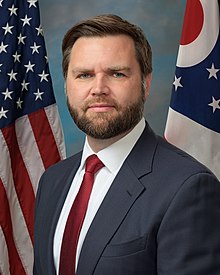JD Vance | |
|---|---|
 Senator Vance during the 118th Congress | |
| President of the United States Senate | |
| Assumed office January 20, 2025 | |
| President pro tem | Chuck Grassley |
| Preceded by | Kamala Harris |
| United States Senator from Ohio | |
| In office January 3, 2023 – January 10, 2025 | |
| Preceded by | Rob Portman |
| Succeeded by | Jon Husted |
| ||
|---|---|---|
|
Personal 50th Vice President of the United States Incumbent Vice presidential campaign Published works
|
||
The United States Senate career of JD Vance began on January 3, 2023, and ended on January 10, 2025. A member of the Republican Party from the state of Ohio, Vance previously served in the United States Marine Corps from 2003 to 2007. He resigned his seat in the U.S. Senate upon being elected Vice President of the United States.
Following incumbent Republican Rob Portman's announcement that he would not seek re-election, Vance declared his candidacy for the United States Senate. He defeated multiple opponents in the Republican primary and went on to defeat Democratic nominee Tim Ryan in the general election. Upon assuming office at the age of 38, he became the first Millennial Republican senator and the first US senator from Ohio without previous political experience since John Glenn in 1974. In 2023, he was described as a "rising star" within the Republican Party and was named to the Time 100 Next List.[1][2] During his tenure, he was the youngest Republican member of the Senate and was widely noted for his Appalachian origin and working poor upbringing.[3][4][5][6]
As a senator, Vance responded to the East Palestine, Ohio train derailment, supported efforts to strengthen border security during the Mexico–United States border crisis, drafted legislation to combat the 2021–2023 inflation surge, and opposed American military aid to Ukraine. In July 2024, he was selected as Donald Trump's running mate in the 2024 United States presidential election. Trump and Vance went on to win the election, defeating the Democratic ticket, incumbent vice president Kamala Harris and Minnesota governor Tim Walz. During the transition, Vance continued to serve in the Senate, cosponsoring the Laken Riley Act. His senate tenure coincided with the last two years of the Biden administration.
Vance served in the senate minority during the first two years of his term. He was Ohio's senior senator for the first seven days of the 119th United States Congress; the last week of his tenure.
- ^ Suter, Tara (September 13, 2023). "Vance, Luna named as rising stars in Time's new '100 Next' list". The Hill. Retrieved January 27, 2025.
- ^ "TIME100 Next List". Time Magazine. 2023. Retrieved January 27, 2025.
- ^ Pruitt, Lisa (June 24, 2022). "What Republicans Know (and Democrats Don't) About the White Working Class". Politico. Retrieved January 27, 2025.
- ^ Rothman, Joshua (September 12, 2016). "The Lives of Poor White People". The New Yorker. Retrieved January 27, 2025.
- ^ "JD Vance: Can Trump's 'hillbilly' win the Senate?". BBC News. May 3, 2022. Retrieved January 27, 2025.
- ^ Heller, Karen (February 6, 2017). "'Hillbilly Elegy' made J.D. Vance the voice of the Rust Belt. But does he want that job?". The Washington Post. Archived from the original on November 25, 2020. Retrieved January 27, 2025.

